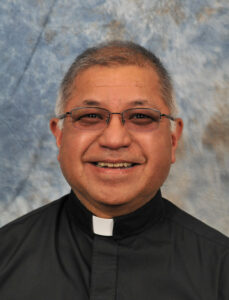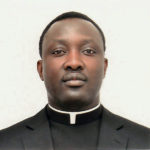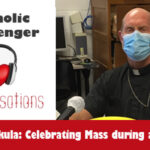By Barb Arland-Fye
The Catholic Messenger
IOWA CITY — Senior Pastor Teresa Stecker suspects that unknown individuals who spray painted racist graffiti on the exterior of Greater Iowa City Church of the Nazarene probably belonged to an organized group of haters. What she knows for certain is that the Johnson County Interfaith Coalition, which includes St. Patrick Parish in Iowa City, stands in solidarity with her multicultural faith community.

The interfaith coalition held a prayer vigil at Church of the Nazarene on March 12, nine days after Stecker discovered the malicious messages as she arrived to open the church for Sunday morning services. Shocked and angered, she reported the vandalism to police and tried to scrub off the hate-filled messages against African refugees and immigrants from other countries before they arrived at the church. Because of the cold weather, boards were placed over the messages until professionals could arrive later in the week to remove the graffiti.
A week before the incident, the church’s refugee alliance program had been in the news, but Stecker doesn’t know whether that publicity triggered the vandalism. The church’s multicultural congregations are English-speaking, Hispanic, Chinese and African. One church goer from the Democratic Republic of the Congo, a country plagued by political upheaval and violence, said things could be worse. Another church goer urged the pastor to install metal detectors.
“Generally speaking, I think for the younger generation it had a higher impact,” Stecker said. They are more keenly aware of random acts of violence because of school lock-downs and other precautions taken when threats are made, she said.
Community response to the vandalism has been amazing. People have come together in faith, sent letters of support and stopped by the church to show that they care. “What is intended for evil, God will bring good out of,” Stecker said. The Sunday following the vandalism, children at Church of the Nazarene performed a previously scheduled event focused on slain civil rights leader Martin Luther King Jr.’s “I Have a Dream” speech. “That was God’s perfect timing,” she said.
The Rev. Anthony Smith, a founding board member of Johnson County Interfaith Coalition, stopped by to offer his support and prayers. He also suggested holding an interfaith prayer vigil because he thought something more needed to be done to express solidarity. “It was a beautiful, amazing service,” Stecker said.
Smith moderated the prayer vigil. Speakers included leaders of Christian, Jewish and Muslim faith communities. “We expressed our support and love of all people in public and didn’t allow the powers of darkness and hate to dominate,” said Father Rudolph Juarez, who attended the prayer vigil. He is pastor of St. Patrick Parish in Iowa City. “The fact that it was a community response that crossed racial and religious and socio-economic boundaries made a statement in and of itself.”

Fr. Juarez attended the vigil as one way to prevent hate-filled vandalism from leading to tragedies such as the mass shooting at a Pittsburgh synagogue last October. “I thought it was important to show support for people who had been singled out. We shouldn’t leave people in isolation, especially victims of hate.”
He worries about the “anti-immigrant sentiment, anti-people-of-color sentiment, the racist sentiment that is increasing because we allowed that environment (of hate) to happen. We live in political times when our leaders at the highest level make it OK to bash immigrants and people of color.”
The priest spoke with The Catholic Messenger the day before a hate-fueled mass shooting at two mosques in New Zealand in which 50 people died. The New York Times reported March 16 that the “terrorist attack appeared to have been carried out by a white nationalist who posted a racist manifesto online and streamed live video of the killings on Facebook.”
Diocesan Social Action Director Kent Ferris was not able to attend the interfaith prayer vigil at Church of the Nazarene but shared in an email with the Johnson County Interfaith Coalition that he was with them in prayer and spirit.
Ferris wrote: “When a house of worship is desecrated for the work they do to welcome the stranger, the pain is felt by every faith tradition and the entire community. Our commitment to God and to others means we will come together to support each other as we minister to those in great need, undeterred by hatred.”











